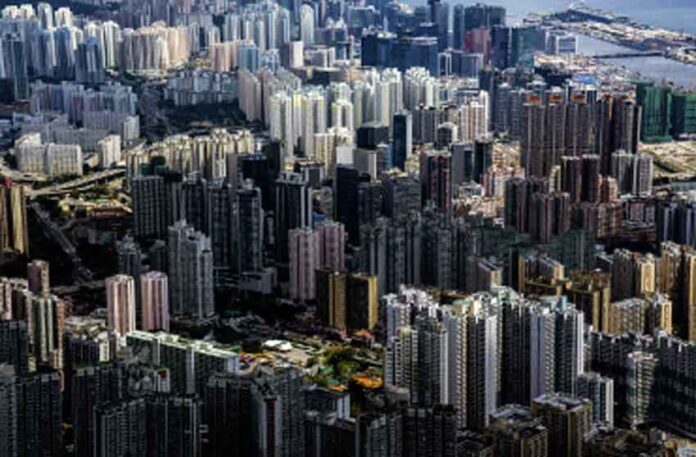For years, Hong Kong’s unique combination of limited land availability and soaring demand has made it home to some of the world’s most expensive real estate. The city is nestled amid mountainous terrain, making its scarce developable land a premium commodity. Hong Kong has a population exceeding 7 million, an increasing number of high-net-worth individuals, and a well-established position as a global financial hub. These factors helped drive residential and commercial property prices to unparalleled heights in recent years.
According to the Knight Frank Wealth Report, this investment demand has propelled luxury property prices to surpass those in other major cities like New York and London, solidifying Hong Kong’s reputation in the global real estate arena.
But the Hong Kong luxury market is now facing an unexpected transformation. Luxury properties are being sold at significant discounts — some up to half off their peak values from 2018. While this scenario opens doors for opportunistic buyers, it spells trouble for current owners if they are under pressure to sell in a less-than-ideal market.
For property owners and investors seeking alternatives to distressed sales, equities-based financing could provide a viable solution. By tapping into the value of their public company shareholdings, entrepreneurs and investors can access much-needed capital without parting from long-term real estate investment positions. Firms like EquitiesFirst specialize in this financing model, offering a potential lifeline to those aiming to weather the current economic storm.
The Downturn in Luxury Properties
According to global real estate concern CBRE Group, a staggering 75% of Hong Kong properties that sold for over $10 million in the first half of 2024 were from sellers facing financial constraints.
Several high-profile cases are indicative of the general severity of the situation in Hong Kong’s high-end real estate market.
In July 2024, four houses located at 26 Plantation Road were sold at 35% below market value for 1.1 billion Hong Kong dollars (approximately $141 million). The sale was driven by the owner’s urgency to repay a substantial private loan secured against the property.
In May, a senior executive of the now-bankrupt Evergrande Group had a property seized by receivers and sold for HK$450 million, over 40% below its 2023 valuation.
Savills, an international property consultancy, reported that during the three months ending in July 2024, sales in The Peak — Hong Kong’s most exclusive neighborhood — averaged 46% below their record-breaking valuations prior to the COVID-19 pandemic. Savills attributed this trend to overleveraged owners being compelled to “settle outstanding debts,” often leading to hurried and substantially undervalued sales.
At the same time, analysts at Savills noted a decline in Hong Kong real estate investment from ultra-high-net-worth individuals in mainland China amid a slowdown in the country’s economic growth.
Indicators of a Potential Rebound
Despite the challenges, several factors suggest that Hong Kong’s luxury real estate market may be on the cusp of recovery. Hong Kong’s currency peg to the U.S. dollar has meant that the aggressive interest rate hikes by the U.S. Federal Reserve hit the Hong Kong real estate market hard. Reeves Yan, head of capital markets at CBRE Hong Kong, explained to Business Insider that this linkage has resulted in higher borrowing costs, with interest rates surpassing the average rental yield of 3%.
But many analysts are hopeful that the Fed’s half-point rate cut in September 2024 is a sign of more to come, and will lead to Hong Kong following with rate cut policies of its own.
The Hong Kong government’s decision in April 2024 to abolish stamp duties and relax mortgage restrictions has already made a positive impact, too. Knight Frank Greater China reported a 114% surge in residential home sales in April, rising to 8,970 units from 4,186 in March following the stamp duties decision.
Moreover, the city’s rental market remains stable. Knight Frank predicts that luxury residential rents could increase by up to 5% this year, indicating sustained demand in the high-end segment.
Positioning for Future Opportunities
In light of these market conditions, property owners and investors are seeking strategies to retain their assets while accessing liquidity. Equities-based financing offers a strategic alternative by allowing individuals to leverage their holdings in publicly traded companies. This approach provides immediate liquidity while enabling investors to maintain their long-term positions in both the stock market and the real estate sector.
By offering capital based on the value of an individual’s shareholdings, EquitiesFirst enables clients to address short-term financial needs without liquidating assets. This method can be particularly advantageous for property owners who anticipate a market rebound and prefer to hold on to their real estate investments until conditions improve.
EquitiesFirst’s financing model could provide the flexibility to take longer positions on the luxury market, and to diversify investment portfolios. Investors can use the capital to strengthen their positions in the broader Hong Kong market or explore new ventures, all while retaining ownership of assets with an eye toward long-term growth.
Hong Kong’s luxury real estate market has undeniably faced headwinds, but history has shown the city’s resilience and capacity for recovery. Those who unlock liquidity without sacrificing long-term investments could position themselves to buy the bottom and benefit from an eventual market upswing.







